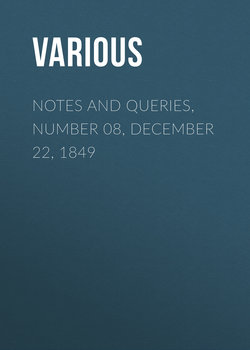Читать книгу Notes and Queries, Number 08, December 22, 1849 - Various - Страница 5
TOWER ROYAL
ОглавлениеSir,—In your second number I find a query by Mr. Cunningham, respecting the origin of the name of Tower Royal; although I cannot satisfactorily explain it, I enclose a few notes relative to the early history of that place, which may, perhaps, afford a clue to its derivation.
In early records it is invariably called "la Real," "la Reole," "la Riole," or "la Ryal or Ryole;" and it is described simply as a "tenement;" I have never found an instance of its being called a "tower". At the close of the reign of Henry III. it was held by one Thomas Bat, citizen of London, who demised it to Master Simon of Beauvais, surgeon to Edward I.; this grant was confirmed by that sovereign by charter in 1277. (Rot. Cart. 5 Edw. I. m. 17.—Placita de Quo Warranto, p. 461.) This Simon of Beauvais figures in Stow and Pennant as Simon de Beawmes. In 1331 Edward III. granted "la Real" to his consort Philippa, for the term of her life, that is might be used as a depository for her wardrobe. (Rot. Pat. 4 Edw. III. 2nd part, m. 15.) By Queen Philippa it was extensively repaired, if not rebuilt, and the particulars of the works executed there by her direction, may be seen in the Wardrobe Account of the sixth year of her reign, preserved in the Cottonian MS. Galba E iii. fo. 177, et seq.; this account is erroneously attributed in the catalogue to Eleanor, consort of Edward I. One Maria de Beauvais, probably a descendant of Master Simon, received compensation for quitting a tenement which she held at the time Philippa's operations commenced. In 1365 Edward III. granted to Robert de Corby, in fee, "one tenement in the street of la Ryole, London" to hold by the accustomed services. Finally, in 1370 Edward gave the "inn (hospitium) with its appurtenances called le Reole, in the city of London," to the canons of St. Stephen's, Westminster, as of the yearly value of 20l. (Rot. Pat. 43 Edw. III. m. 24.)
It is sufficiently clear that in the thirteenth and fourteenth centuries this place was not called Tower Royal; nor does there appear to be any ground for supposing it was so named in earlier times, or, indeed, that it was ever occupied by royalty before it became Philippa's wardrobe. The question, therefore is narrowed to this point:—what is the significance of "la Real, Reole, or Riole?" I should be glad if any of your correspondents would give their opinions on the subject. I may add, that the building was in the parish of St. Thomas Apostle, not in that of St. Michael Pater Noster Church, as Stow wrote. (Rot. Pat. 4 Edw. III. 2nd part, m. 38.)
T.H.T
Let me refer Mr. P. Cunningham to "Stow's Survey, p. 27. 92. Thoms' Edition," for a full answer to his query. The passages are too long to cite, but Mr. C. will find sufficient proof of the part of a royal residence having once stood in this obscure lane, now almost demolished in the sweeping city improvements, which threaten in time to leave us hardly a fragment of the London of the old chronicler.
The Tower was also called the Queen's Wardrobe, and it was there, Froissart tells us, that Joan of Kent, the mother of Richard II., took refuge during Wat Tyler's rebellion, when forced to fly from the Tower of London. The old historian writes that after the defeat of the rebels "pour le premier chemin que le Roy fit, il vint deuers sa Dame de mère, la Princesse, qui estoit en un chastel de la Riolle (que l'on dit la Garderobbe la Reyne) et là s'estoit tenue deux jours et deux nuits, moult ébahie; et avoit bien raison. Quand elle vit le Roy son fils, elle fut toute rejouye, et luy dit, 'Ha ha beau fils, comment j'ay eu aujourd'huy grand peine et angoisse pour vous.' Dont respondit le Roy, et dit, 'Certes, Madame, je le say bien. Or vous rejouissez et louez Dieu, car il est heure de le louer. J'ay aujourd'huy recouvré mon heritage et le royaume d'Angleterre, que j'avoye perdu.' Ainsi se tint le Roy ce jour delez sa mère." (Froissart, ii 123. Par. 1573.)
